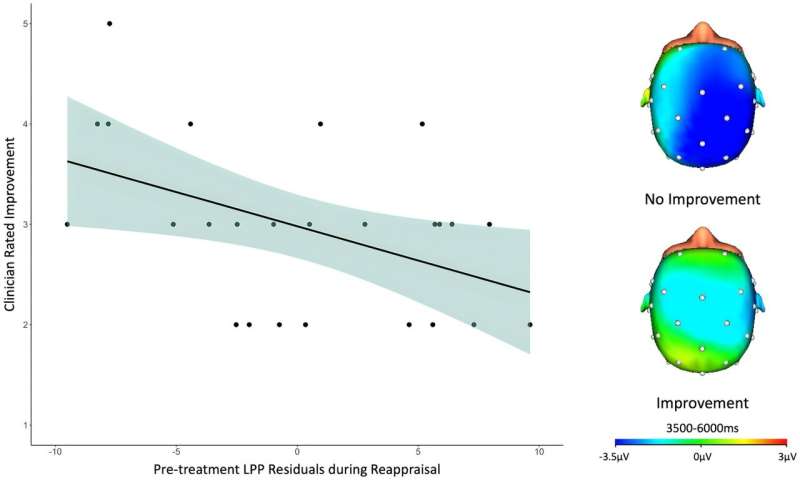This article has been reviewed according to Science X's editorial process and policies. Editors have highlighted the following attributes while ensuring the content's credibility:
fact-checked
trusted source
proofread
Study reveals brain function predictors of treatment outcomes for adolescent depression

A recent study published in Research on Child and Adolescent Psychopathology demonstrates that measures of brain function related to emotional processing in adolescents with depression could improve predictions of treatment outcomes in response to cognitive behavioral therapy (CBT).
Adolescents whose electroencephalogram (EEG) scans revealed the most difficulty with positive and negative emotional processing before CBT showed the most improvement with treatment, indicating that CBT may meet the treatment needs of these patients.
CBT focuses on teaching specific skills that target underlying processes of emotion regulation and reward processing. In CBT for depression, adolescents are taught skills such as cognitive reappraisal (i.e., recognizing negative thoughts and changing them into more positive or neutral thoughts) and behavioral activation (i.e., engaging in behaviors that activate pleasant emotions).
The study results could indicate that adolescents with depression who show typical emotional processing may benefit from other treatments. According to senior author Autumn Kujawa, even though CBT is one of the most effective treatments for depression, 40% to 60% of adolescents with depression do not respond to CBT and could benefit from alternative treatments, either alone or in combination with CBT. While little information exists on who is most likely to benefit from specific treatments, this study sheds light on the adolescents who may respond best to CBT and a new way to potentially identify who they are.
"The findings from this study provide a promising, preliminary step towards personalizing treatment for depression as well as integrating neuroscience research with clinical practice," said Lindsay Dickey, the study's first author and a doctoral student in Vanderbilt University's Clinical Science Program in Psychological Sciences.
The study also found that self-reported levels of emotion regulation skills and reward responsiveness did not predict CBT treatment outcomes. The finding underscores the importance of measuring brain function and that integrating neuroscience into clinical practice could potentially support the development of more effective, individualized treatment plans and even prevention of depression.
"If we can understand what's happening at the brain level in terms of emotionality and which processes are contributing to risk for depression and treatment outcomes, then we could potentially intervene earlier to change the processes before the development of depression," said Kujawa, associate professor of psychology and human development.
As next steps in her lab, Kujawa's team is conducting studies that focus on possible ways to prevent the onset of depression, including developing positive emotion interventions targeting reward processes. Her team also plans to study ways to increase reward responsiveness in 8- to 12-year-olds who may be at risk for depression, with the goal of preventing depression development and reducing its burden on children and families.
More information: Lindsay Dickey et al, Neural Predictors of Improvement With Cognitive Behavioral Therapy for Adolescents With Depression: An Examination of Reward Responsiveness and Emotion Regulation, Research on Child and Adolescent Psychopathology (2023). DOI: 10.1007/s10802-023-01054-z



















